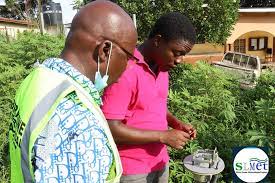The Sierra Leone Meteorological Agency (SLMET) with support from the Agricultural Value Chain Development Project (AVDP), a brainchild of the International Fund for Agricultural Development (IFAD) has on Monday 4th October 2021 commenced nationwide workshops on Weather Forecasting for Climate-Smart Agriculture in Southern Bo. The training which will be extended to Port Loko and Kabala in the Northern Region, is in line with the Agency’s plan to commence the issuance of climate information to help capacitate farmers to embark on, and sustain resilience farming. Climate-smart agriculture or farming includes the integration of social, economical, and environmental development to meet the challenge of providing sustainable livelihood to farmers, attainment of food security on hungry millions, and the eradication of poverty. This also includes the development of agriculture ‘smart enough’ to survive the onslaught impact of climate change.
Speaking at the opening ceremony – District Council Hall, Falaba in Bo, Chairman, and Lead Facilitator of the workshop, Gabriel Kpaka, who also doubles as Deputy Director-General of SLMET, said…
“ climate-related impacts are already plummeting crop productivity in some parts of the world and many crops that use to maximize production have experienced less productivity over the last decade; a trend that is projected to continue as temperatures rise further across the globe. To tackle this, farmers can adapt to some changes, but data shows that there is a limit to what we can be able to mitigate if we continue with non-climate smart approach. This is why the Agency is making efforts to ensure access to archival and current weather data, develop a database of soil, weather, genotypes, land-use patterns and water resources” .
In this way, we can be able to create communication streams between the Agency and farmers geared towards improving crop yield.
In his statement, the Chairman of the Bo District Council, Jospeh Munda Bindi expressed his gratitude for the opportunity the Agency has accorded his district to benefit from such useful training. He said that a lot has changed in the weather pattern with huge impacts on crop productivity; and as such, farmers and other persons in the agricultural sector including the council need to have access to weather information that can help them cope with the changing climate and adapt to climate-smart farming.
“If we want to change the scenario in respect of food sufficiency and sustainability, we should embrace this workshop and demand more from SLMET and other relevant stakeholders to provide more information to enhance farming and livelihoods”, he said.
The Chief Administrator (CA) of Bo District Council, Abdul Koroma expressed similar sentiments, adding that weather has and continues to change so much that one can even experience rain in March of each succeeding year with harmattan even being felt with no fixed timeline compared to decades ago.
“ We therefore, encourage SLMET to cascade this information sharing to the chiefdom and community levels and also, as a reliable partner, commend them for organizing such a workshop aimed at providing valuable information to farmers at the local level”._
Ministry of Agriculture Deputy Director- South, Samuel Benson Palmer on behalf of the Ministry expressed gratitude for the engagement and call on all farmers to take advantage of the information.
“Due to the change in the climate, coupled with the continuing shift in the weather pattern, SLMET and its partners including the Ministry of Agriculture are concerned about the changing trend and as such find this engagement very useful and informative”, he said in his brief and to the point remarks.
Similarly, AVDP Climate-Smart Specialist, Gassimu Bhonapha in the South of Bo expressed his appreciation for the training and maintained that it is time for such effort, especially when he believes that government has now more than ever laid more premium on weather issues.
He emphasized the fact that the environment is deteriorating at an increasing rate. The variability in terms of the weather is visible as well, and that, he says is affecting plants and livestock.
“In consideration of all of this, the government has rolled out the agricultural development value chain – to enhance climate resilience yield in agriculture across oil palm, rice, cocoa, and vegetables in an agriculture smart fashion that cannot deplete the environment, and also increase crop productivity”, Mr. Bhonapha says._
He went further to state that there is no way AVDP can get this done alone, and for which SLMET is helping to provide adequate and real-time weather information to help track rainfall and its trend, period marking the end of the rain, and also sun prevalence across the country, before and during the two marked seasons of rain and dry. He further mentioned that the Sierra Leone Agricultural Research Institute (SLARI) is currently helping to develop a variety of crops that can withstand the change in weather and the Environmental Protection Agency (EPA) helps monitor environmental compliance.
Paramount Chief, Prince Boima of Kakua Chiefdom in the Bo District, expressed his gratitude for the engagement while maintaining that most of the changes occuring in the Environment is caused by man and that it is only us that can change the narrative.
He maintained that SLMET deals with the weather and climate change by providing the necessary information, but that it is left with the people to use it for the right purpose in enhancing crop productivity.
While giving personal account on how his crops have done badly in the last five years, he encouraged all participants to use the information shared to ensure crops thrive and using climate resilience methods.
The one week engagement will today, October 5th, 2021 be held in North West District of Port Loko and expected to conclude in Koinadugu by Friday 8th October, 2021.


